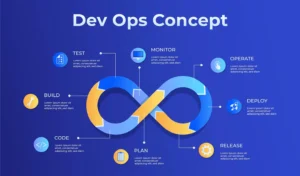In the evolving landscape of IT and software development, two terms often come up in conversations around infrastructure management, deployment automation, and operational efficiency: DevOps and SysOps. While both focus on maintaining and delivering reliable software systems, they differ significantly in their approaches, tools, and philosophies.
This article breaks down the key differences between DevOps and SysOps, including their roles, responsibilities, tools, goals, and how they fit into modern IT operations.
Both DevOps and SysOps have emerged to meet the growing demand for rapid development and dependable infrastructure in IT. As organizations transition from traditional software delivery methods to modern, agile environments, understanding how these two approaches differ is essential to choosing the right path or building the right team.
DevOps Training in Pune provides a great environment to upskill these valuable skills
What is DevOps?
In order to reduce the development lifecycle and consistently produce high-quality software, DevOps is a culture, methodology, and collection of technologies that blends software development (Dev) with IT operations (Ops). It emphasizes:
- Continuous Delivery and Integration (CI/CD)
- Automation of testing, deployment, and monitoring
- Infrastructure as code (IaC)
- Cooperation between the operations and development teams
By encouraging a culture of shared ownership, quick feedback, and automation, DevOps aims to close the gap between developers and IT operations.
Key Features of DevOps:
- CI/CD pipelines for rapid software delivery
- Agile and lean principles
- Toolchain automation (e.g., Jenkins, GitLab CI, Docker, Kubernetes)
- Emphasis on collaboration and breaking down silos
- Fail-fast culture with a focus on experimentation and iteration
What is SysOps?
System operations, or SysOps, is the term used to describe the traditional function of system administrators in charge of overseeing, maintaining, and managing IT infrastructure. It entails duties like
- Configuring and supplying servers
- Management of users and permissions Backups and disaster recovery
- Network security and firewall configuration
- Performance tuning and system health monitoring
While SysOps roles are evolving, they are generally more operations-centric, focusing on system stability, uptime, and reliability.
Key Features of SysOps:
- Emphasis on system administration and control
- Manual or semi-automated provisioning and maintenance
- Strong focus on security, compliance, and uptime
- Use of traditional IT tools like Nagios, Puppet, Ansible, Zabbix
- Reactive and incident-driven approach
DevOps vs. SysOps: Key Differences
Now, let’s explore how DevOps and SysOps differ across various dimensions:
1. Roles and Responsibilities
| Aspect | DevOps | SysOps |
| Primary Role | Combine development and operations for continuous delivery | Maintain and operate infrastructure reliably |
| Focus | Automation, CI/CD, collaboration | Stability, system uptime, maintenance |
| Daily Tasks | Building pipelines, managing containers, monitoring metrics | Server management, patching, responding to alerts |
2. Culture and Philosophy
- DevOps adopts an agile mindset, promoting experimentation, automation, and cross-functional collaboration.
- SysOps traditionally adheres to a more conservative philosophy, emphasizing stability, change control, and incident management.
DevOps encourages frequent changes, quick feedback loops, and shared responsibilities. SysOps, on the other hand, may follow ITIL or similar frameworks that enforce strict change management policies.
3. Tools and Automation
| Category | DevOps Tools | SysOps Tools |
| CI/CD | Jenkins, GitLab CI, CircleCI | Rarely used |
| Configuration Management | Terraform, Ansible, Chef | Ansible, Puppet |
| Monitoring | Prometheus, Grafana, ELK stack | Nagios, Zabbix |
| Containers & Orchestration | Docker, Kubernetes | Limited use |
| Cloud Infrastructure | AWS CloudFormation, Pulumi | AWS CLI, manual console operations |
4. Approach to Change
- DevOps thrives on continuous change. Changes are small, frequent, and reversible, which minimizes risk.
- SysOps often use a change control board (CCB) to authorize updates, resulting in slower and more rigid change cycles.
DevOps = Change is the norm.
SysOps = Change is a risk to be managed carefully.
5. Collaboration and Communication
- DevOps teams include both developers and operations professionals who collaborate throughout the product lifecycle.
- SysOps teams typically operate separately from development teams and focus on infrastructure performance and reliability.
In DevOps, the “you build it, you run it” principle applies. Development and operations are more separated in SysOps, which frequently results in a communication breakdown.
6. Monitoring and Troubleshooting
- DevOps uses real-time monitoring, log aggregation, and alerting tools that enable proactive response.
- SysOps typically depend on traditional monitoring dashboards and alerts focused on server health and uptime.
DevOps tools help monitor application-level performance, whereas SysOps tools monitor system-level metrics.
DevOps and SysOps in the Cloud Era
The distinction between DevOps and SysOps has become hazier due to the growth of cloud computing.
Cloud’s Impact on DevOps:
- Infrastructure as code (IaC) using tools like AWS CDK or Terraform
- Seamless integration with CI/CD tools
- Enables rapid scaling, deployment, and rollback
Cloud’s Impact on SysOps:
- Shifts traditional SysAdmin duties to cloud-native operations
- Emphasizes monitoring cloud resources, managing IAM, ensuring compliance
- Requires an understanding of cloud security models and best practices
While SysOps professionals now manage cloud-native infrastructure, DevOps teams build systems that can scale and evolve automatically in these environments.
Which One Should You Choose?
The decision between DevOps and SysOps is based on your professional objectives and the requirements of the company.
Choose DevOps if:
- You’re interested in automation, development, and modern toolchains
- You enjoy collaboration and agile practices
- You’re aiming for roles like DevOps Engineer, Site Reliability Engineer (SRE), or Platform Engineer
Choose SysOps if:
- You prefer working on infrastructure, server maintenance, and security
- You enjoy maintaining system stability and reliability
You’re targeting roles like Systems Administrator, IT Operations Engineer, or Cloud SysOps Administrator
- Some professionals pursue certifications like
- DevOps: AWS DevOps Engineer, Microsoft Azure DevOps Engineer
- SysOps: AWS SysOps Administrator, RHCSA, CompTIA Server+
Both paths are valuable, and increasingly, organizations are seeking hybrid roles where knowledge of both DevOps and SysOps practices is essential.
Conclusion
While DevOps and SysOps both play essential roles in modern IT, they represent different mindsets and operational models.
- DevOps is agile, automated, and collaborative, focusing on accelerating software delivery through CI/CD and cloud-native technologies.
- SysOps is stable, secure, and operational, ensuring that infrastructure and systems are reliable and performant.
In the end, DevOps and SysOps are not mutually exclusive—they can (and often do) coexist, especially in enterprises that need both innovation and stability. Understanding the differences—and how they complement each other—will help you make informed decisions in your tech career or while building your IT team.







